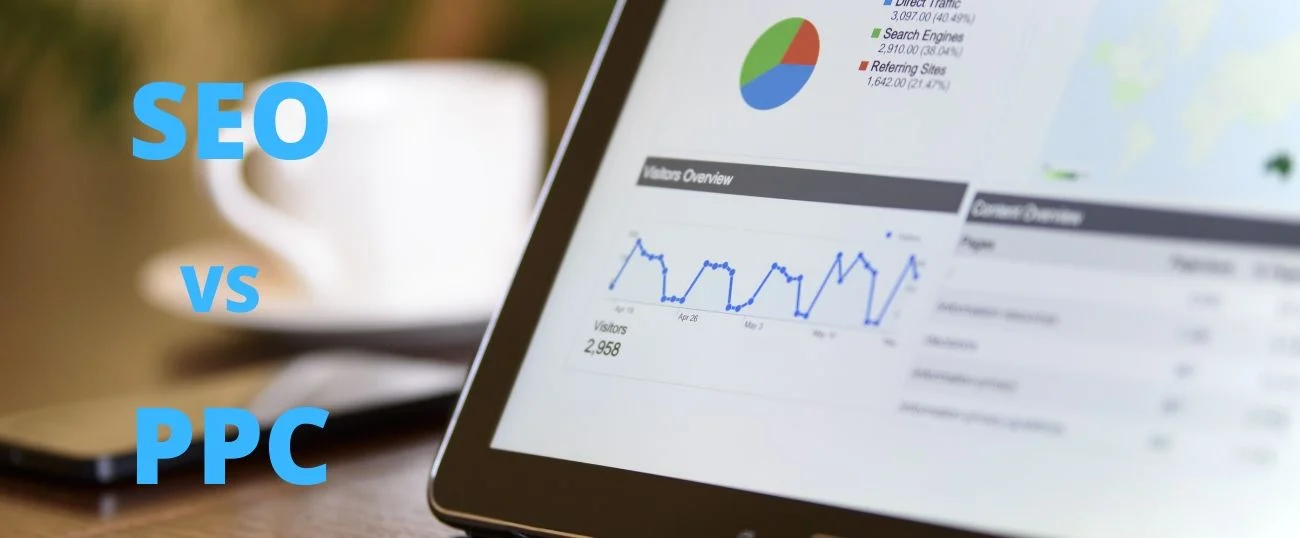
SEO vs PPC – Know What Your Business Needs
Google answers 3.5 billion search queries a day; that’s 40,000 every second! That’s not all – there’s also a huge number of businesses in any given niche.
With such huge volumes of searches and so much competition – how does a business actually go about making sure that their information ranks high enough to be clicked and consulted with.
There are 2 ways in which one can implement their plan of ranking higher-up in search engines; they are – SEO & PPC.
Because Google holds a monopoly in the search engine market – we will use Google as a basis to explain both the terms – SEO & PPC.

What is SEO

SEO is Search Engine Optimisation. Though the true meaning of SEO is significantly broad – it can briefly be described as the digital efforts a website and its owner(s) put in, to ultimately rank higher-up in search engines – through organic means.
The methods used here are all free and content-based. Which means that a business has to produce quality content regularly enough to be able to be known to Google as a quality business that provides quality content that is actually useful to people.
What is PPC

PPC is Pay-Per-Click. In PPC – businesses use monetary means of getting ranked higher-up in Google search results. This is done through sponsoring the content that a particular business wishes to rank higher for.
Although this method yields significant results – it is not always as easy as simply investing money and just ranking higher – there is competition involved here too. This means that the content still has to be of good quality and should be valuable to enquirers.
This is not a broad concept as SEO but still contains quite a variety of variables when it comes to inculcating it into a website.
Difference between SEO & PPC
Organic Traffic – Other than time and patience – something that is vital for quality content – there is no direct (monetary) investment that garnering organic traffic requires. Though, in order to really be successful – one of the biggest requirements is to produce quality content consistently.
This requires time, effort and diligence. The aim for/of any business that wants to flourish online should always be to produce content that matters and is of relevance to searchers, readers and potential customers. Without it, a company would be a broken ship without a compass within a vast ocean.
Although there are options that businesses could use – like paid advertising – the main focus of any company should always be to create valuable content for their target audience.
Recent studies have shown that this method would at least require 6-10 months of a consistent workflow; and, if consistency is lost – it could lead to a backlash of the efforts that have been put in.
Paid Traffic – This is a process to garner results that are more instant. This means that a business can spend money in Paid Search Ads by Google and get more visibility than opting for a longer and more organic approach.
By using this method – a business can get more visibility (move higher-up in Google’s rankings – even higher than some of the top-most organic discoveries). Although, there is a caveat involved – because even though you pay as much for your Ads to rank high up in the listings – your content will still have to have a good degree of relevancy because you will not be only one paying for Ads.
Even for Ads, there is competition for not only for ranking of Ads but, also for the Ads to even be visible. Your Google Ad campaigns can get you (almost) instant results, provided – you follow the discipline laid-out by Google and of course – pay for them. Also, your Ads will only show for as long as your campaign will run.
Related Post – Top Free SEO Tools for 2020
Which to Choose and When – SEO or PPC?

Nowadays, a lot of marketing is focused on content. Content is and always has been a broad category; be in the form of text, sound – podcasts, radio content, etc or media – images, info-graphics, renders, print, video, etc.
Now, let’s take for an example the initiative of an Ad agency that wants to conduct a marketing campaign for a locally opened, new – coffee shop. For their launch and a bit more of prolonged marketing – the agency comes up with a variety of content that spans across all of the 3 mediums that we have just discussed.
Although it is now time for the agency to launch their campaign and begin distributing their content across various channels – they must first know and decide how much and in how much frequency they should put-out the content.
This is a big decision. And, if the agency is a good one then they would’ve already made an informed decision about this whilst planning the production of their content. This means that the agency must know what kind of advertising and marketing strategies they must use to promote their new client.
There are two ways to go about this –
The Organic Way – Choosing SEO

Here, the agency must launch their campaign using all the methods that use a free and more holistic approach. In this case – it would firstly include creating and setting-up various profiles across relevant Social Media platforms that would reach and receive maximum impact for their audience.
The content – carefully curated for their target audience must then be posted – systematically. There should be techniques in place to analyse the impact of their content. There should be implemented ‘social listening’ – something that helps a business to be in touch with the existing trends on social media. There should always be room for improvement.
Organic marketing for a business is vitally essential for various reasons. One of the biggest reasons that instantly comes up is – goodwill. Without a strong social presence – no business even trying to do good would be able to do good; this is just how the world of advertising and marketing now works. Hence – no matter what – a company must not only aspire to have a determined presence on social media but should also plan and implement their way into the game efficiently.
Must-haves for SEO
- A well-built website.
- The website must be user-friendly and easily navigable.
- The site must contain a variety of multimedia content.
- It should load as fast as possible on desktop as well as mobile devices.
- The content on the site should be optimised in such a way that it is sprinkled with relevant keywords that people are searching for.
- The site should be updated regularly – in the sense that the content should be relevant to the business and to the present times. This can be done by the timely posting of articles and blogs and revising some of the base content on the website, or, even switching some of the media on the website.
Related Post – Why is Video Content good for SEO?
The Paid Way – Choosing PPC

Using the same example mentioned above, Let’s say that the organic campaign launched by the agency for the same coffee shop has sort-of hit a wall.
The campaign has been live and running as planned and is well into its sixth month; and – although – everything that had been decided – has been executed and more – neither the agency nor the coffee shop owner is seeing the kind of results that they expected.
It was a true fact that when the campaign had launched – there was a buzz in the air about it. The people not only responded on social media but also visited the shop. But, as time went along – the reach had reached an almost stagnation point and even the frequency of the regular customers also considerably reduced.
Now, this doesn’t always go to show that the business is a bad one. Yes, they’ve got a good product, service and ambience and yes – they kept-up with some of the trends that were going along in the current market. They were still doing enough to keep on running and could have even sustained on it for a quite a while; but, when it comes to growing and expanding – they were not certainly not doing enough.
Here is exactly where a paid form of marketing comes into the picture. Now, there are numerous methods for paid marketing. It can be through the form of boosting through social channels, paying for clicks through Ads on various platforms or even through presenting Ads on search engines like Google and Yahoo.

Whatever the platform – as soon you decide to pay for space to reach out to your intended customer base – you enter the domain of paid advertising and marketing. This form of marketing will certainly help you to (if done correctly) out-perform your competitors and reach out to your target audience quicker.
Paying for clicks is one of the biggest tools in today’s internet marketing world – where there most certainly is a lot of competition. The amount of time and effort that goes into reaching more customers is directly reduced by the price you allocate off of your budget.
Although you will still need to continue with your organic approach as your main stem – you can easily complement your entire marketing strategy with a paid form of marketing to achieve much better results.
Must-haves for PPC
- An account with Google.
- A good and well-optimised Landing Page.
- Well-researched keywords that are relevant to search enquiries.
- Explore and use Google Adwords and Analytics regularly.
- Direct focus towards what people are actually searching for.
- Always know more about your target audience and potential customers.
- A/B Testing. Always have two different plans in place when running your marketing campaigns. If one doesn’t work as planned – try the other.
When to use SEO –
- Do SEO when you have a smaller marketing budget.
- Do SEO when you have a sustainable long-term goal.
- Choose SEO when your marketing is based around content.
- Go with SEO when you want your brand to be discovered by a certain type of niche audience.
- Choose SEO for maximum ROI over a longer time horizon.
When to use PPC –
- Do PPC when you’re looking for accelerated results.
- Do PPC when you want to quickly compete for a better ranking in search engines.
- Do PPC when you’re SEO plan is not working according to your expectations.
- Do PPC when your campaign is set and you’re looking to maximise your ROI over a certain group of keywords.
- You can go for PPC when you’re looking for a better ROI over a short-term horizon.
And Finally…
Variety is the spice of life. An enterprise must always use different methods to conduct its business. It is always essential to have a mix of various techniques in the bag. There should always be a safety net and back-up plan in place.
In the digital world of conducting business – there are a lot of ways to move ahead. These should be used soundly and in synchronisation with each company’s goals and objectives.
Thus – in conjunction with the example used above – a company should always do utmost justice to an organic approach and must then complement it with a paid form of advertising and marketing to reap maximum benefits.
For more articles please visit our blog: https://seagulladvertising.com/blog


